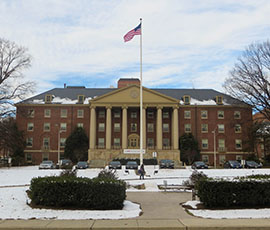51łÔąĎÍř’s full-semester study group at the in Bethesda, Md., offers students a rare opportunity to conduct research at one of the world’s foremost institutions of health science and discovery.
Now in its 21st year, the 51łÔąĎÍř continues to be a wellspring of scientific achievement and learning, and remains the only one of its kind. A new series of videos provides a snapshot of this immersive program, with students sharing their experiences both inside and outside the classroom.
Participants in the fall NIH study group worked in laboratories conducting research into diabetes, HIV, universal flu vaccine, and molecular-level cancer treatment, to name a few. Each week during the program students work at least 30 hours in a laboratory pertaining to their academic interest, and take two related academic courses.
“In our lab we’re studying the function of adult neurogenesis,” said , a cellular major from Boulder, Colo. “In the long run, this will have huge implications in the biomedical world for people with neurodegenerative disorders and people with brain injury.”
, associate professor of psychology and director of the fall NIH Study Group, said he sees students undergo a transformation, from learning theory and following experiments in a textbook, to making scientific discoveries in a professional laboratory.
“It’s no longer something that somebody has designed in a lab to show a principle, but it’s actually trying to write the book of knowledge, and they’re part of it,” Yoshino said. “They’re part of finding the answer.”
Ninety-three percent of students who participated in the NIH program from 2007-2011 have gone on to receive advanced degrees following graduation, with 59 percent earning MDs, 32 percent PhDs, and 9 percent other graduate degrees.

